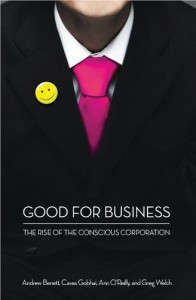“The fact is, corporate reputation matters more today because brand matters more. Over the past half century, we have moved beyond markets dominated by commodity goods to a world in which it is virtually impossible to buy anything that doesn’t have some form of logo or other identity mark stamped on it. And consumers are increasingly identifying themselves with and through the brands they buy.” (Benett et al., 2009: xiii)
In Good for Business: The Rise of the Conscious Corporation , authors Benett, Gobhai, O’Reilly and Welch look at the changes that corporations must make to grow and thrive in a more informed and questioning society. They highlight the four cornerstones of a successful as well as conscious business:
, authors Benett, Gobhai, O’Reilly and Welch look at the changes that corporations must make to grow and thrive in a more informed and questioning society. They highlight the four cornerstones of a successful as well as conscious business:
Purpose Beyond Profit
Humanized Leadership
Corporate Consciousness
Collaborative Partnerships
Some corporations mentioned in the book include: Nike, Google, Whole Foods, DuPont, Wal-Mart, Procter and Gamble, GE, Microsoft, and Apple.
Title: Good for business : the rise of the conscious corporation
Authors: Andrew Benett, Cavas Gobhai , Ann O’Reilly & Greg Welch
Publication info: New York : Palgrave Macmillan, 2009.
Availability: Click here
